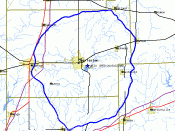The Federal Communications Commission (FCC) was established on June 19, 1934 as a result of congress. The purpose of this commission is to help regulate interstate and foreign communications. The FCC is an independent regulatory government agency. This agency was made to replace the outdated Federal Radio Commission. In its place, the FCC not only monitors radio communications, but is responsible for the supervision of telegraph, telephone, and television communications as well. The FCC allocates broadcasting frequencies, which makes all decisions regarding granting, modifications, or revocations of broadcasting licenses, and generally is expected to protect the public interest in matters of communication.
In the field of radio, the FCC regulates AM and FM broadcasting and other kinds of radio services. The FCC issues construction permits and licenses for all nongovernmental radio stations. It also assigns frequencies, operating power, and call signs; inspects transmitting equipment, and regulates the use of such equipment.
Television broadcasting is regulated by the FCC the same way. The commission also regulates the use of cable channels and the quality of service delivered by cable television.
In other operations, which include telephone, telegraph, radio, and satellite communications, the FCC issues regulations and supervises service. The FCC is responsible for domestic administration of the telecommunications provisions of treaties and international agreements, and licenses radio and cable circuits from the United States to foreign points. The Emergency Broadcast System, the notification that alerts and instructs the public in the event of enemy attack, is supervised by the FCC; the system is regularly used for broadcasting weather warnings and may also be used in local emergencies.
The most important privileges granted to the FCC are powers to license, short license, withhold, fine, revoke or renew broadcast licenses, and construct permits. These powers are based on the commission's own evaluation of...


